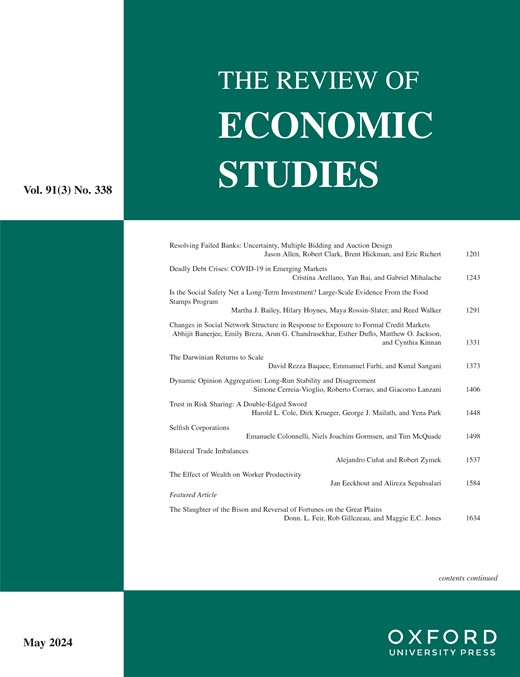行为单部门增长模型的均衡分析
IF 6.4
1区 经济学
Q1 ECONOMICS
引用次数: 0
摘要
人们通常认为,大量的行为偏差、错误和理性决策的限制,使均衡分析变得更加棘手。我们确定,在Ramsey-Cass-Koopmans或Bewley-Aiyagari模型等单一部门增长模型的背景下,情况并非如此。我们将经济对环境或政策变化的反应分为两部分:给定(税前)价格的直接反应,以及随着价格变化而产生的均衡反应。我们的主要结果表明,在弱规律性条件下,无论行为偏好、错误和决策约束的细节如何,当且仅当直接反应(来自相应的消费-储蓄模型)涉及总储蓄的增加时,长期均衡将涉及更大的资本-劳动比率。这一结果的一个含义是,从定性的角度来看,行为偏差对长期均衡有影响,当且仅当它们改变了直接反应的方向。我们提供了详细的插图,说明如何应用这一结果,并使用误解、自我控制和诱惑、naïve和复杂的准双曲贴现模型产生新的见解。本文章由计算机程序翻译,如有差异,请以英文原文为准。
Equilibrium Analysis in Behavioral One-Sector Growth Models
Rich behavioral biases, mistakes and limits on rational decision-making are often thought to make equilibrium analysis much more intractable. We establish that this is not the case in the context of one-sector growth models such as Ramsey-Cass-Koopmans or Bewley-Aiyagari models. We break down the response of the economy to a change in the environment or policy into two parts: the direct response at the given (pre-tax) prices, and the equilibrium response which plays out as prices change. Our main result demonstrates that under weak regularity conditions, regardless of the details of behavioral preferences, mistakes and constraints on decisionmaking, the long-run equilibrium will involve a greater capital-labor ratio if and only if the direct response (from the corresponding consumption-saving model) involves an increase in aggregate savings. One implication of this result is that, from a qualitative point of view, behavioral biases matter for long-run equilibrium if and only if they change the direction of the direct response. We provide detailed illustrations of how this result can be applied and generates new insights using models of misperceptions, self-control and temptation, and naïve and sophisticated quasi-hyperbolic discounting.
求助全文
通过发布文献求助,成功后即可免费获取论文全文。
去求助
来源期刊

Review of Economic Studies
ECONOMICS-
CiteScore
10.40
自引率
3.40%
发文量
75
期刊介绍:
Founded in 1933 by a group of young British and American economists, The Review of Economic Studies aims to encourage research in theoretical and applied economics, especially by young economists. Today it is widely recognised as one of the core top-five economics journals. The Review is essential reading for economists and has a reputation for publishing path-breaking papers in theoretical and applied economics. The Review is committed to continuing to publish strong papers in all areas of economics. The Editors aim to provide an efficient and high-quality review process to the Review''s authors. Where articles are sent out for full review, authors receive careful reports and feedback. Since 1989 The Review has held annual May Meetings to offer young students in economics and finance the chance to present their research to audiences in Europe.
 求助内容:
求助内容: 应助结果提醒方式:
应助结果提醒方式:


